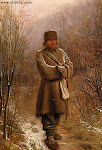Having said all the above about such a wealth of things to quote, and out of so many good things to quote, one stands out as approaching the sublime; this from the eighth letter:
Some people feel guilty about their anxieties and regard them as a defect of faith. I don't agree at all. They are afflictions, not sins. Like all afflictions, they are, if we can so take them, our share in the Passion of Christ. For the beginning of the Passion--the first move, so to speak--is in Gethsemane. In Gethsemane a very strange and significant thing seems to have happened.
It is clear from many of His sayings that Our Lord had long foreseen His death. He knew what conduct such as His, in a world such as we have made of this, must inevitably lead to. But it is clear that this his knowledge must somehow have been withdrawn from Him before He prayed in Gethsemane. He could not, with whatever reservation about the Father's will, have prayed that the cup might pass and simultaneously known that it would not. That is both a logical and a psychological impossibility. You see what this involves? Lest any trial incident to humanity should be lacking, the torments of hope--of suspense, anxiety--were at the last moment loosed upon Him--the supposed possibility that, after all, He might, He just conceivably might, be spared the supreme horror. There was precedent. Isaac had been spared: he too at the last moment, he also against all apparent probability. It was not quite impossible...and doubtless He had seen other men crucified...a sight very unlike most of our religious pictures and images.
But for this last (and erroneous) hope against hope, and the consequent tumult of the soul, the sweat of blood, perhaps He would not have been very Man. To live in a fully predictable world is not to be a man.
At the end, I know, we are told that an angel appeared "comforting"* Him. But neither comforting in sixteenth-century English nor ἐνισχύων in Greek means "consoling." "Strengthening" is more the word. May not the strengthening have consisted in the renewed certainty--cold comfort this--that the thing must be endured and therefore could be?
We all try to accept with some sort of submission our afflictions when they actually arrive. But the prayer in Gethsemane shows that the preceding anxiety is equally God's will and equally part of out human destiny. The perfect Man experienced it. And the servant is not greater than the master. We are Christians, not Stoics.
Does not every movement in the Passion write large some common element in the sufferings of our race? First, the prayer of anguish; not granted. Then He turns to His friends. They are asleep--as ours, or we, are so often, or busy, or away, or preoccupied. Then He faces the Church; the very Church that He brought into existence. It condemns Him. This also is characteristic. In every Church, in every institution, there is something which sooner or later works against the very purpose for which it came into existence. But there seems to be another chance. There is the State; in this case, the Roman state. Its pretensions are far lower than those of the Jewish church, but for that very reason it may be free from local fanaticisms. It claims to be just on a rough, worldly level. Yes, but only so far as is consistent with political expediency and raison d'état. One becomes a counter in a complicated game. But even now all is not lost. There is still an appeal to the People--the poor and simple whom He had blessed, whom He had healed and fed and taught, to whom He Himself belongs. But they have become over-night (it is nothing unusual) a murderous rabble shouting for His blood. There is, then, nothing left but God. And to God, God's last words are "Why has thou forsaken me?"
You see how characteristic, how representative, it all is. The human situation writ large. These are among the things to be a man. Every rope breaks when you seize it. Every door is slammed shut as you reach it. To be like the fox at the end of the run; the earths all staked.
As for the last dereliction of all, how can we either understand or endure it? Is it that God Himself cannot be Man unless God seems to vanish at His greatest need? And if so, why? I sometimes wonder if we have even begun to understand what is involved in the very concept of creation. If God will create, He will make something to be, and yet to be not Himself. To be created is, in some sense, to be ejected or separated. Can it be that the more perfect the creature is, the further this separation must at some point be pushed? It is saints, not common people, who experience the "dark night." It is men and angels, not beasts, who rebel. Inanimate matter sleeps in the bosom of the Father. The "hiddenness" of God perhaps presses most painfully on those who are in another way nearest to Him, and therefore God Himself, made man, will of all men be by God most forsaken?
*CSL makes this textual comment probably because he may have been reading from the Latin and/or Greek. In the Latin the word is "confortans" which is analogous to our word "comfort". All the modern English translations have "strengthen" or "strength". Another point is that I don't know what Greek text he was using or if the publisher made a boo-boo, but in the book I am quoting from it is spelled thus: ἐννισχύων.



